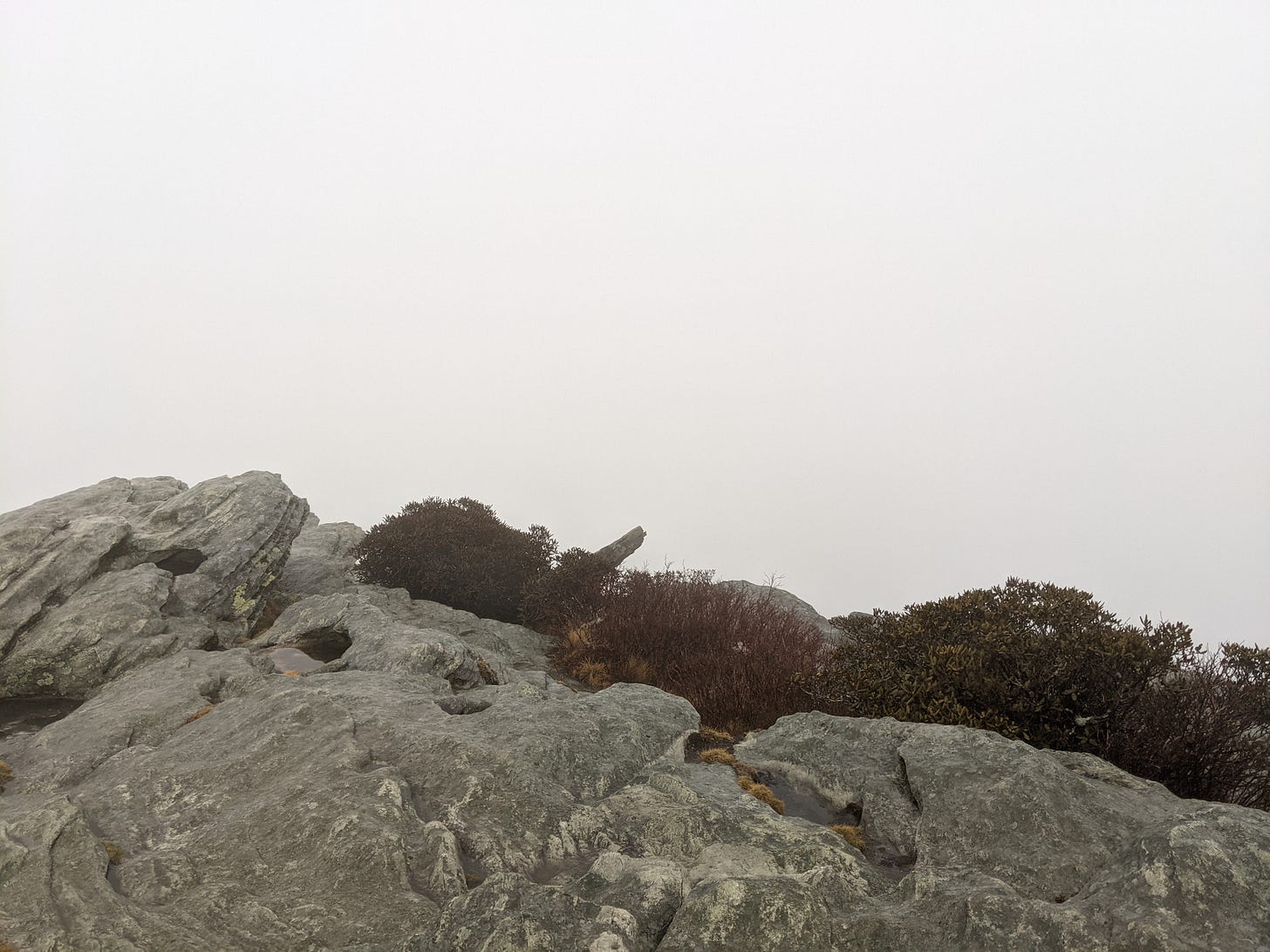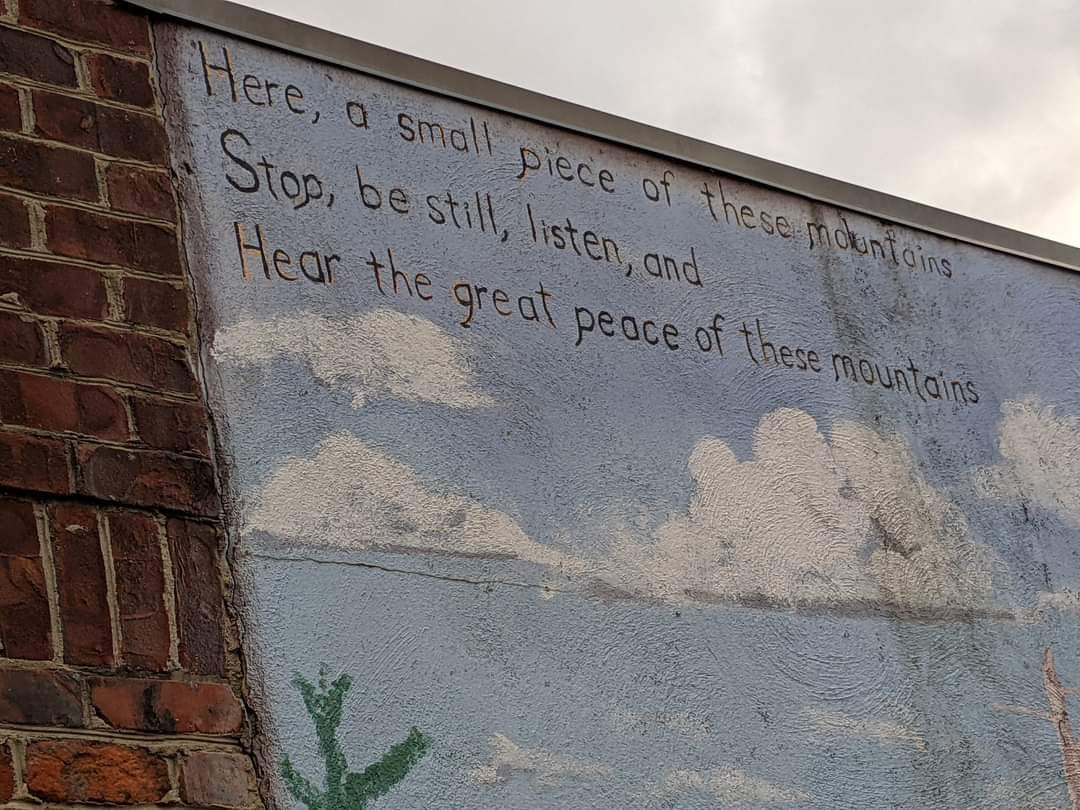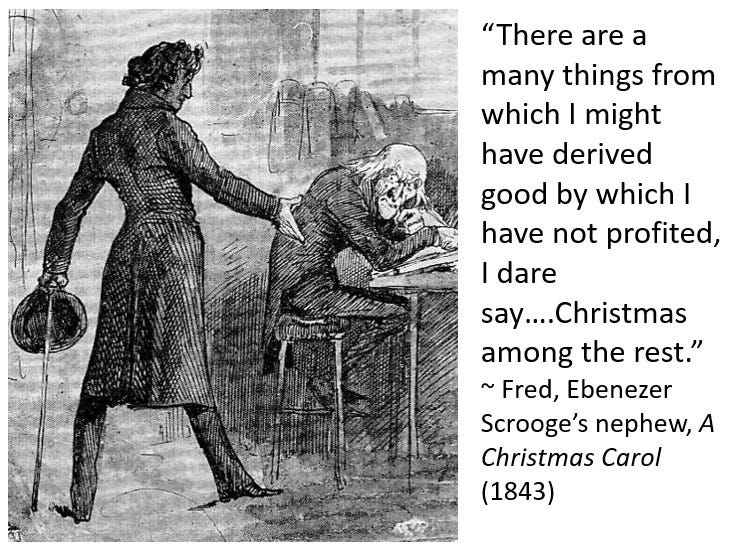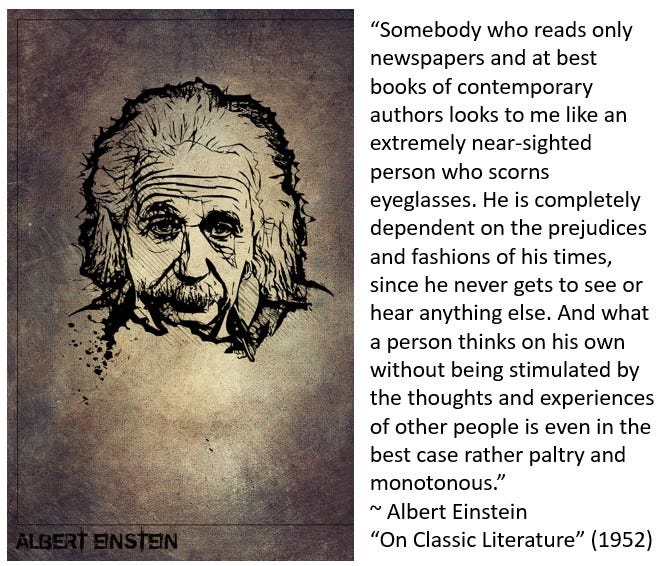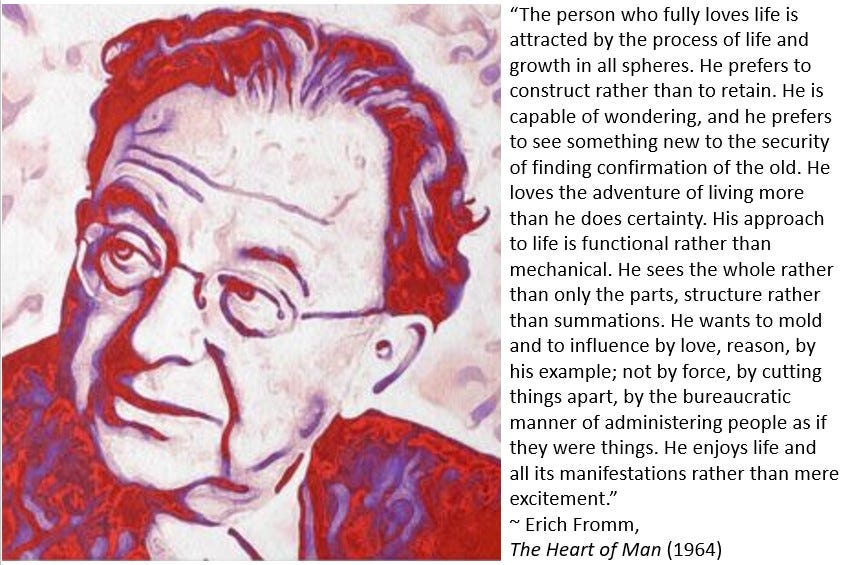A Biophilous Revolt: Looking Back at 2022 from Hawksbill Mountain
300 Subscribers and the Top 12 Posts of 2022
I celebrated the New Year with my wife and children in a quaint cabin perched in the mountains of a small North Carolina town called Clyde. On New Year's Eve, we enjoyed a cozy evening of tickle fighting and games, including our new family favorite card game, Llama Drama, Christmas Edition.
We honored the ending of the year and emergence of a new year with root beer floats and shared highlights from 2022 and hopes for 2023. We discussed joys, challenges, and plans for our growth as human beings in the year to come.
One of my many highlights from 2022 took place the day before New Year's Eve. Our crew of flatlander Floridians hiked up an off-the-beaten hiking trail near Linville, famous for Linville Falls and Linville Caverns, called Hawksbill Mountain Trailhead.
We arrived at the unpaved parking area in Pisgah National Forest on a foggy, drizzly day. The path was muddy much of the way and became increasingly steep. Our steps along the well-worn trail were guided by exposed roots and stone forming natural stairs and banisters of curvy mountain laurel.
We walked between trees along the path that stood narrowly together offering their trunks as shoulders to support our ascent. We paused to admire boulders inviting us to step up and peer into the distance, and we marveled at the slowly thawing ice left from a recent freeze. (I remind the reader that ice cycles and snow are rather exotic to those of us who live where the temperature in December stays in the 70s.) The woods along the way offered clean, crisp air and sweet wooded fragrance, while tree branches and lingering winter leaves sheltered us from the worst of the rain.
About a mile up we took a rightward path passing by a large campsite and into a clearing that introduced Hawksbill’s majestic, expansive rock face. Heavy clouds obscured the usual bountiful 360-degree vista.

Yet there was something wondrous about the clouded 4,000-feet summit. I was struck with awareness of the infinite as I gazed out over the edges of the craggy peak, where swirling cottony white clouds filled or formed an endless, mysterious expanse. I felt giddy with awe, humility, and aliveness. Sharing the experience with my children and wife only heightened the experience. The approach of sunset and unsheltered rainfall abbreviated our stay at the summit. Before embarking on the descent I paused to take-in the enlivening beauty, appreciate the intermittent rushes of cool air from 4,000 feet above my usual relationship to sea-level, and observe a small gray bird hopping along the rough stone ground.
Such simple yet profound and pleasant encounters with the living renew our biophilia, love of life and the living. They also offer us insight into the true aims of human existence. An idea simply expressed on a mural in downtown Waynesville, North Carolina.
Just before leaving for the journey up Hawksbill Mountain, on December 30th, Humanities in Revolt garnered its 300th subscriber.
The joy of this aimless hike to Hawksbill’s summit testifies to the primacy of intrinsic value in a meaningful human existence. The experience was a reminder of the ignorance in a life centered on mechanisms and gain as ends-unto-themselves. A cogently worked out understanding of life makes it clear that life’s purpose is not reducible to “gain” or “profit.” As Ebenezer Scrooge’s nephew, Fred, reminded him in Charles Dickens’, A Christmas Carol (1843),
“There are a many things from which I might have derived good by which I have not profited, I dare say….Christmas among the rest.”
Honoring and examining such an insight is one of the chief aims of this very publication.
A Milestone Before the New Year
Like the trek up Hawksbill Mountain, this newsletter was yet another source of joy in 2022. I have appreciated the opportunity to share some of the ideas, works, and questions I explore in the college classroom with a wider, diverse public. I believe the humanities offer us invaluable insight and nourishment as we navigate the complexities of our personal, social, political, and ethical lives. Your readership, feedback, and engagement with posts makes it clear that I am not alone in this conviction. I was additionally humbled with invitations from readers to deliver in-person talks throughout 2022.
Developing Humanities in Revolt has not been without difficulty. Finding time—rather, making it—to author regular posts while also maintaining a heavy teaching load and prioritizing familial commitments is not always easy. Growing the readership and ensuring posts come into contact with a wider public requires social media work that includes creating posts and images, searching from synergetic groups and pages, and engaging with those interacting with posts. It has also required financial resources to promote posts in social media spaces. But these labors, buoyed by your support, have proved worthwhile.
Humanities in Revolt’s growth has been made possible by paid subscribers who not only inspire me to make the time necessary to produce this publication, but also financially support efforts to grow our reach and readership. Free subscribers who read and share posts are also invaluable contributors to this growth.
Just before leaving for the journey up Hawksbill Mountain, on December 30th, Humanities in Revolt garnered its 300th subscriber. This constituted a gain of more than 200 readers in 12-months. The increase in Substack subscribers was matched on Facebook where we gained 801 new followers, allowing for greater opportunities to engage the wider public with the questions, insights, and works of the humanities. (If you are on Facebook and have not yet liked the page, please do so here.)
This growth has been made possible by paid subscribers who not only inspire me to make the time necessary to produce this publication, but also financially support efforts to grow our reach and readership. Free subscribers who not only read posts but also share them are also invaluable contributors to this growth. Thank you!
Humanities in Revolt’s growth is particularly significant for a publication committed to exploring ideas and views that are not always favorable to the 24-hour news cycle, siloed media echo-chambers, and self-congratulatory messaging.
Top 12 of 2022
Humanities in Revolt was visited more than 16,000 times in 2022. Below is a list of the most visited essays in order of popularity. Our aim is to publish pieces that are timely but not limited to a relevance determined by 24-hour news lifecycles. If successful, many of the pieces below will remain relevant in 2023 and beyond.
Be sure to give those you missed a read and share your favorites with others. And if your favorite didn’t make the top twelve, leave a comment below letting us know which piece you most enjoyed in 2022.
Living Truths and Dead Dogmas: How the Humanities Honors Freedom of Thought and Expression
Being Good by "Going to Hell"? The Difficulty of Being Good, and the Virtue of Disobedience
Life is Not an Investment: Dead-end Production and the Non-Profit Goods of Life
“Worthless Degrees” and the Hidden Hand of Values: How Values Shape the Facts of Our Lives
Getting Our Priorities Straight: Humanities and the Art of Living
From FDR to Coretta Scott King: Economic Rights and the New Poor People's Campaign
The Top Gun Effect: Why Hollywood Movies Matter to the U.S. Military
Don't Shoot the Philosopher: Ethics and the Pursuit of Moral Integrity
Humanity Beyond the Headlines
Humanities in Revolt’s growth is particularly significant for a publication committed to exploring a range of ideas and views that are not always favorable to the 24-hour news cycle, siloed media echo-chambers, and self-congratulatory messaging. In critically examining deeply embedded common sense assumptions we not only stimulate inspiration, but we also facilitate critical self-examination and discomforting inquiries.
We take seriously the injunction of great thinkers including Thoreau and Einstein to recognize the intellectual malnourishment of narrowly concerning ourselves only with “news of the day.” In a 1952 essay, Einstein compared those who read “only newspapers” and “contemporary authors” to “an extremely nearsighted person who scorns eyeglasses.” Overreliance on the views and thought of the present makes one “dependent on the prejudices and fashions of his times, since [one] never gets to see or hear anything else. And what a person thinks on his own without being stimulated by the thoughts and experiences of other people is even in the best case rather paltry and monotonous.”
Henry David Thoreau also offered a valuable critique of the intellectually near-sighted in his lecture, “Life Without Principle” (1863). The quality of ordinary conversation of his day was hampered, he contended, by took great a concern with news of the day.
“We rarely meet a man who can tell us any news which he has not read in a newspaper, or been told by his neighbor; and, for the most part the only difference between us and our fellow is that he has seen the newspaper, or been out to tea, and we have not.”
The news itself lacks substance because of its narrow attention to the present and attraction to acrimony and conflict.
“The news we hear, for the most part, is not news to our genius. It is the stalest repetition…..In health we have not the least curiosity about such events. We do not live for idle amusement. I would not run round a corner to see the world blow up.”
Thoreau is not recommending that we “burry our head in the sand” of pressing matters of public concern. Just that we develop the discernment to differentiate stultifying gossip and inane information from ideas and events that deserve our attention. He reminds us of the intellectual and emotional immaturity of devoting our limited and ever-dwindling hours of life to careening our neck to watch the latest cultural car crash.
Whereas Einstein identified chief the problem as a lack of attention to those before our time, Thoreau contends that we must make time to be alone with our own inner, private voice and thought.
“In proportion as our inward life fails, we go more constantly and desperately to the post-office. You may depend on it, that the poor fellow who walks away with the greatest number of letters, proud of his extensive correspondence, has not heard from himself this long while.”
We can only smile in thinking of mailed written letters as distractions from sustained inner reflection. Today, an endless barrage of cacophonous noises drown out the increasingly faint whisper of our unique thoughts.
The goal of Humanities in Revolt is not to hide from the news of the day nor to ignore the pressing concerns that all who love life must attend to. The goal is rather to honor the importance of personal contemplation in dialogue with the greatest works and ideas of past and present.
Humanities in Revolt attempts to take a longer view of the fundamental values, experiences, and ideas that bring us into touch with elemental characteristics of the human condition. We seek something richer, more substantive than transitory gain or exaggerated polarization between cultures and peoples. In place of easy answers or quick, simplistic judgments, we seek to facilitate honest reflection upon challenging questions and their varied possible solutions.
A Biophilous Revolt
As stated in a January 2022 post announcing the name of this project, Humanities in Revolt is committed to, above all, honoring the primacy of ends over the mere means of life. Rather than honoring objects—things, mechanisms—our aim is to nurture what Erich Fromm called the biophilous orientation.
In The Heart of Man (1964), Fromm explained that the necrophilous orientation was composed of a love of force, control over others, and the mechanized or routinized rather than the dynamism inherent to life.
“The necrophilous person is driven by the desire to transform the organic into the inorganic, to approach life mechanically, as if all living persons were things. All living processes, feelings, thoughts are transformed into things. Memory, rather than experience; having, rather than being, is what counts. The necrophilous person can relate to an object—a flower or a person—only if he posses it; hence a threat to his possession is a threat to himself; if he loses possession he loses contact with the world.”
By contrast, the biophilous orientation is rooted in a love of life, the organic and the dynamic. Fromm writes:
“The person who fully loves life is attracted by the process of life and growth in all spheres. He prefers to construct rather than to retain. He is capable of wondering, and he prefers to see something new to the security of finding confirmation of the old. He loves the adventure of living more than he does certainty. His approach to life is functional rather than mechanical. He sees the whole rather than only the parts, structure rather than summations. He wants to mold and to influence by love, reason, by his example; not by force, by cutting things apart, by the bureaucratic manner of administering people as if they were things. He enjoys life and all its manifestations rather than mere excitement.”
We are perfectly entitled to critically interrogate Fromm’s conceptual ordering of human conduct into these two character orientations. As Fromm readily admits, few of us are exclusively rooted in one or the other orientation. My purpose is referencing Fromm’s two orientations is to highlight the clear contrast in ways of living and understanding of life they offer us. Our devotion to or becoming of one or the other is not predetermined or fated. Rather, it is decided by our choices and the kinds of spiritual-ethical-humanistic nourishment we give to ourselves. The humanities continue to be a wellspring for sustaining humanity’s growth toward biophilia away from objectification and dehumanizing bureaucratization of life.
Rather than exalting ideas, works, discoveries, or events on the basis of their supposed novelty, Humanities in Revolt seeks to participate in contemplation and dialogue on quintessentially human concerns and questions. That is to say, the aim is to consider matters that defy fleeting trends and manipulative deadlines to “act now” before “thinking through” the basis of those actions and the values upon which they rest. We welcome and shake hands with those who find this biophilous revolt a worthy endeavor.
If you enjoyed this post please share it with others and like it by clicking the heart icon. Be sure to subscribe if you haven’t already.
Invite Dr. Nall to Speak
Dr. Nall delivers energetic live presentations and engaging workshops on the subjects featured in Humanities in Revolt. Those interested in booking a workshop or talk can get in touch through Facebook or by leaving a comment.
Subscribe
Subscribers will receive periodic posts pertaining to the broad domain of humanistic inquiry, from the insights of great thinkers throughout human history, the meaning and importance of critical thinking and ethics, the underappreciated poetry in everyday existence, to contemporary cultural analysis and the ongoing struggle to combat human oppression and violence. You will also have the opportunity to engage the author and our online community in dialogue about each post.
Why get a paid subscription?
Paid subscriptions directly support Dr. Jeffrey Nall’s efforts to produce and share publicly accessible independent scholarship and analysis. Supporting donations can also be made through PayPal. For more about my work go to JeffreyNall.com and find me on Twitter, Facebook, and Instagram.






